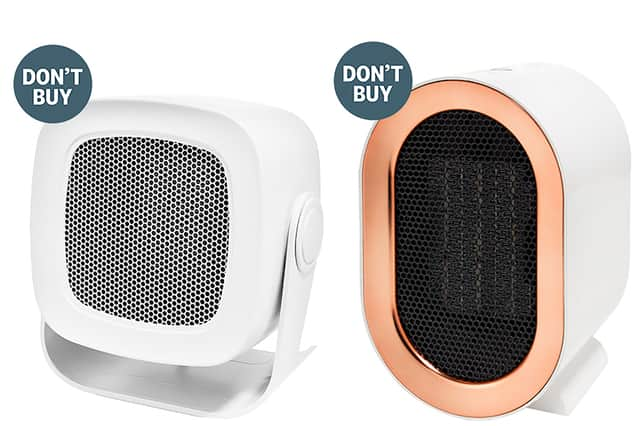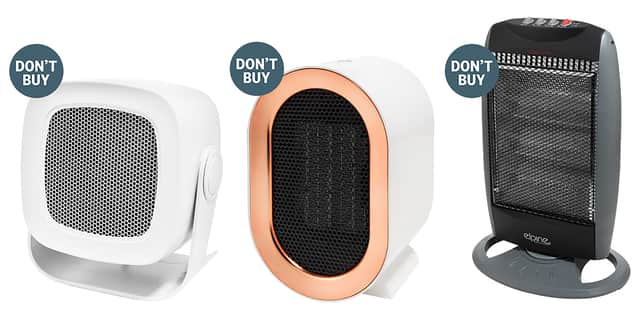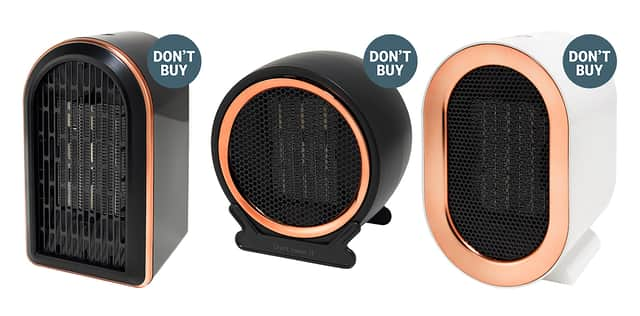Heaters sold on TikTok and Temu ‘could explode, cause shock or start fires’, warns consumer group Which


Electric heaters which are being sold on popular social media sites TikTok and Temu could explode, cause electric shocks or start house fires, consumer group Which? has warned.
The watchdog bought and tested eight electric heaters from the sites, which cost as little as £7.20 from TikTok Shop and Temu, and found that six were electrically unsafe. The unsafe heaters were, however, being promoted by influencers who have million of followers
Advertisement
Hide AdAdvertisement
Hide AdTesting found that the £7.20 XH-1201 1200W portable electric heater bought from TikTok was a fire hazard while also posing an explosion threat, and could also cause electric shocks. Which? found 16 sellers listing the heater on TikTok, quoting 223 sales.
An identical £16.98 portable space heater purchased from Temu from a listing that stated 2,100 had been sold could similarly give users an electric shock, cause a fire or explode, Which? found. When researchers looked for other Temu-based sellers, they found another claiming 6,700 sales.
Another heater, the X7 Portable space heater sold for £14.99 on Temu, had not been properly assembled and the live parts were easy to access, running the risk of electric shock. The seller Which? bought from had sold 353 of them, but researchers found two more sellers listing identical products and claiming 8,900 sales between them.
The NFJ004 Portable electric heater costing £15.99 on TikTok was made so badly that it could give owners an electric shock, catch fire or explode, testers found.
Advertisement
Hide AdAdvertisement
Hide Ad



Only one legal to be sold in UK
Overall, three of the five heaters bought through TikTok for Which? tests were “dangerously unsafe” and the instructions for a fourth were lacking key safety warnings, while all three heaters bought through Temu presented a danger to anyone using them. Only one of the eight heaters Which? tested from TikTok and Temu was both safe to use in the home and legal to be sold in the UK.
When Which? searched for “electric heaters” on TikTok, it found five videos within the first 100 results promoting the dangerous products, which were marked “paid partnership” or “commission paid”. The videos had more than 100,000 views between them.
Both TikTok and Temu have removed all heaters that failed the testing, along with 27 listings for identical dangerous heaters. However, Which? said it had found that more similar listings had since appeared in their place. It has called for online marketplaces to have more legal responsibility for unsafe and illegal products sold to consumers via their platforms.
It warned that new online marketplaces such as TikTok and Temu can achieve millions of app downloads but currently pass responsibility for safety to sellers who are beyond the reach of UK regulations. Recent Which? research found that around 2.8 million UK consumers made a purchase through TikTok in 2023, while 8.2 million UK consumers bought through Temu.
Advertisement
Hide AdAdvertisement
Hide AdWhich? head of consumer protection policy Sue Davies said: “Cheap electric heaters are a tempting purchase for consumers struggling during the cold winter months, but our latest tests have revealed that models sold on TikTok and Temu are a serious safety risk and must be avoided at all costs. It’s vital that the Government urgently gives greater legal responsibility to online marketplaces for unsafe products so that they are forced to take action to prevent dangerous products ending up in people’s homes.”
Products removed from sale
Temu said all four heaters identified by Which? as safety hazards had been removed from the platform. The platform said: “We deeply regret any concern or inconvenience caused by the safety issues identified in four electric heaters on our platform. The safety of our customers is our highest priority, and we have taken immediate action to address this issue.
“Temu operates a marketplace for independent third-party sellers who must adhere to strict compliance and legal standards before listing their products. In instances of non-compliance, we act swiftly to investigate and take necessary measures to protect our customers, which may include product removals and seller account terminations.”
TikTok said: “TikTok uses a combination of technology and manual moderation to enforce our policies for TikTok Shop. If TikTok finds merchants or products that violate their policies, they remove them.”
Advertisement
Hide AdAdvertisement
Hide AdLesley Rudd, chief executive of the charity Electrical Safety First, said: “New platforms for shoppers are contributing to dangerous products flooding the market, worsening the problem every day and leaving more shoppers exposed to unsafe goods. The way we shop has changed, possibly forever, yet it is utterly illogical that our laws have not, leaving people shopping on these online platforms grossly unprotected from dangerous electrical products.
“Influencers promoting goods on platforms also have a moral duty to their followers to ensure what they are promoting is safe or risk exposing them to dangerous products.” She added: “The current framework is broken and urgent legal changes are essential to regulate these platforms once and for all. The slow pace of the Government’s review into product safety leaves our laws outdated and unfit for the way we shop today. We urge them to take decisive action to speed up the process and protect lives.”
A Department for Business and Trade spokeswoman said: “The Office for Product Safety and Standards continues to take action against unsafe products sold online and those who sell them, including through the use of intelligence to disrupt their supply. Manufacturers and suppliers are required to place only safe products on the market and are responsible for issuing instructions on how a product can safely be used. If anyone has concerns about an unsafe product, they should provide the relevant information and we will consider it.”
Comment Guidelines
National World encourages reader discussion on our stories. User feedback, insights and back-and-forth exchanges add a rich layer of context to reporting. Please review our Community Guidelines before commenting.
